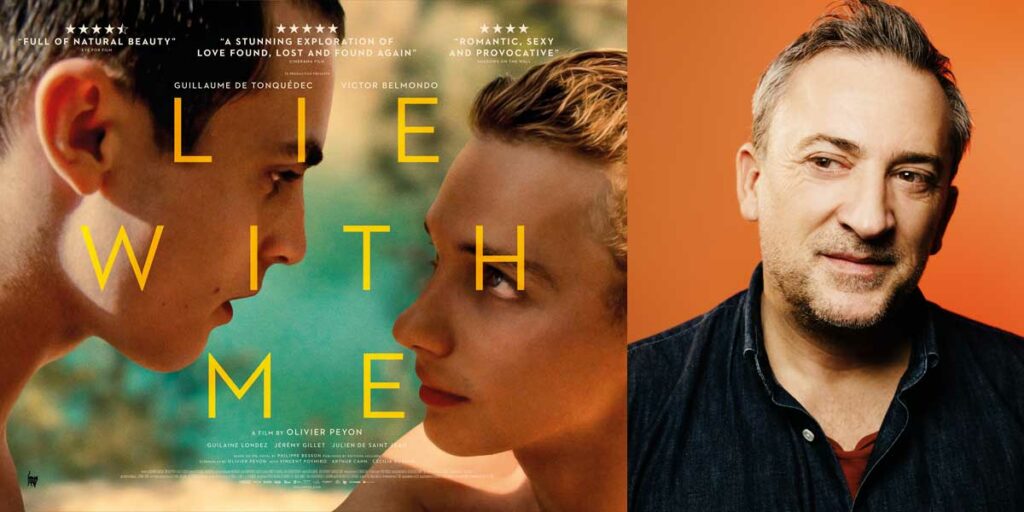We sat down to interview director Olivier Peyon ahead of the UK release of his incredibly moving movie Lie With Me, to learn more about his filmmaking process.
Lie With Me is making its UK debut across cinemas and digital this weekend, August 18th, after being showcased at the BFI Flare Film Festival 2023 earlier this year. Based upon the bestselling novel by Phillipe Besson, Olivier Peyon’s adaptation follows the unravelling and intertwining of two relationships that take place years apart. The dual-narrative places us in present day and 1984 Cognac, France, as celebrated author Stéphane Belcourt (Guillaume de Tonquédec) returns to his hometown and strikes up an unexpected friendship with a young man named Lucas (Victor Belmondo).
We later learn that there is an invisible tie that binds the two together: Lucas’s late Father Thomas (Julien De Saint-Jean). In flashbacks set in 1984, we watch as a bittersweet and innocent love story begins, and just as quickly falls apart. Stéphane and Thomas are two teens that were from completely different worlds: Stéphane is the gentle, kind and warm friend that enjoys literature and writing, and Thomas is the stereotypical ‘bad-boy’ that wears dark clothes, is mysteriously cool, and absolutely despises the thought of anybody discovering the secret gay relationship he has begun with Stéphane.
Peyon’s enthralling and emotional adaptation flickers between the highs and lows of a first love, and invites us into the cherished conversations between Lucas and Stéphane within the present day, as Lucas learns more about his Father’s sexuality, and Stephane sees flashes of what could have been his life, reminiscing on the feelings he shared with his teenage love before Thomas disappeared without leaving a trace behind.
We sat down with Olivier Peyon to learn a little more about how he approached his adaptation of Lie With Me, how much the project means to him, and his initial thoughts after first reading the novel. Read our full interview below!
Olivier Peyon on the Differences between his Film Adaptation and the Book:
At what point of you reading the novel did you know that this was a story you wanted to adapt for the big screen, and how did the movie come to life?
Olivier Peyon: The construction of the novel is different to the one of the film, and the biggest part of the novel is about the teenage love story. I love that story, but for me, it was not very original, yet the second part of the book was the encounter between the writer and the son, and this part really struck me a lot. It was really, really moving.
That’s the part that was original to me, and it’s what made me realise that I wanted to make a movie…it was at the end of the book, when I was crying, not from the start when I was reading it. In France, in the reviews of the novel, all the critics were talking about this first part, this teenage love story, which was great and also autobiographical, but I was really surprised when I read the novel to discover this other part. When I met Phillipe Besson for the first time, I told him that I wanted to develop the present part and he loved the idea. He told me that it was okay to change the narrative [and “betray” the storyline of the novel] to focus more on the author/son part, because the greatest betrayals make the best adaptations, so I was really free.

I noticed that the actual translation from the book title is Stop With Your Lies, rather than Lie With Me. I think they both fit the story really well, but I was interested in learning more about the decision to alter the translation for the film’s title in the UK.
O.P.: We decided to keep it so that the readers can make the connection. But I must say, I really love the English title, because there are two meanings, and at one point when I was writing the script, I changed the title of the French title to use the English title, because in French, it’s really beautiful, but there’s just one meaning.
In France we decided to keep the French title of the novel or the novel, because the book was a huge success in the country and so I would have been very crazy not to keep the original title. But when I decided to keep the French title for the French film, I thought a lot about the notion of lies, which is of course, in the novel. But I wanted to develop the theme of the lies more in the movie, because there is something in the film which is not in the novel: that the son lies. At the start, he pretends not to know the writer, but of course he knows him very well, and so he lies. Then there is this turning point in the movie, where the writer suddenly discovers that the son is lying. There are no lies like this in the novel, so, once I decided to keep the French title, I worked on it in the script.
Olivier Peyon on the Release of Lie With Me, and how much the Filming Process meant to the Cast
I have to say that the casting choices were so perfect! Everybody portrays their character so well. Had any of them read the book before they were cast? Or was this something that followed afterwards, before filming, in order to get into character?
Olivier Peyon: The two young actors [Julien De Saint Jean and Jérémy Gillet, who play Thomas and the younger version of Stéphane] were the only ones who had read the book before, since the novel was a huge success. I did the casting for those two, really, at the end of the process, whereas Victor Belmondo [Lucas] and Guilaine Londez [Gaëlle] were there from the start.
So when I did the casting for Julien De Saint Jean and Jérémy Gillet, it was four months before the shooting, and I learned that they had read the book before. It was really important for me, even before the casting, because they recognised the importance and the meaning of the sex scenes. In the novel, these scenes are more sexual, but my version of the scenes is a little bit softer, so it was really important that they had read the book. They understood and we were able to talk a lot about the meaning of the scene, which helped me a lot, and also helped them in filming the scenes.
I know that Victor Belmondo had never read the book, just the script, but I invented so much about his character that I told him:”yeah, of course, you can read it, but your character is quite different from the book.”
Guillaume de Tonquédec [older Stéphane] had read the book a week after he read the script, but similarly for him, I invented a lot of things. In the novel, he is a very famous writer but he has no problems with being in love with a guy, but I said to Phillipe Besson: happiness doesn’t make a story, I have to change it. I read all of Phillipe’s books, watched lots of interviews of him, and thought perhaps in the film the writer could be a portrait of Phillipe Besson 10 years earlier: perhaps he, too, was once a little bit lost in love.
I’ve seen you talk about how you drew from some personal experiences when creating the script for the film. How does it feel to see the positive reactions as it starts to be released, and to see how much Lie With Me means to the LGBTQ community?
O.P.: It’s really bizarre, because I’m always writing scripts or doing films, and I’m always doing it for me first, and when the film is over, it’s like when you have a kid, and you have to let it go. But I’m really touched and happy with all of the reviews and all the comments on the film, because it was so important for me, but also for the actors for so many reasons, and on the set during the shooting, it was really moving.
It was not my first movie, but it was really important for me, in my life. And to see that people liked it in the same way that we loved doing it, that’s the point. It’s not exactly about my personal life; it’s more about the emotion we all put into creating it too, and I do think I succeeded in translating my reasoning for wanting to do the film for the audience. So it’s good: it’s all that I had hoped for, and it’s now a good surprise.
This interview was edited for length and clarity.
Lie With Me was released in cinemas and on digital in the UK on August 18, 2023 and will be out on DVD and VOD in the US on February 15, 2024.

